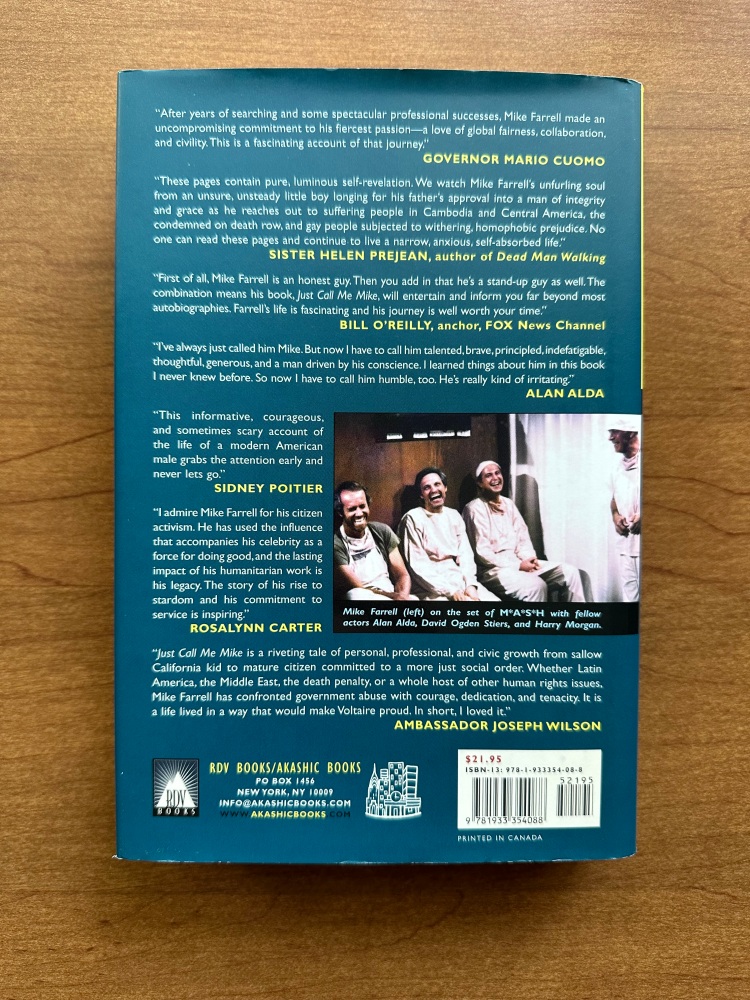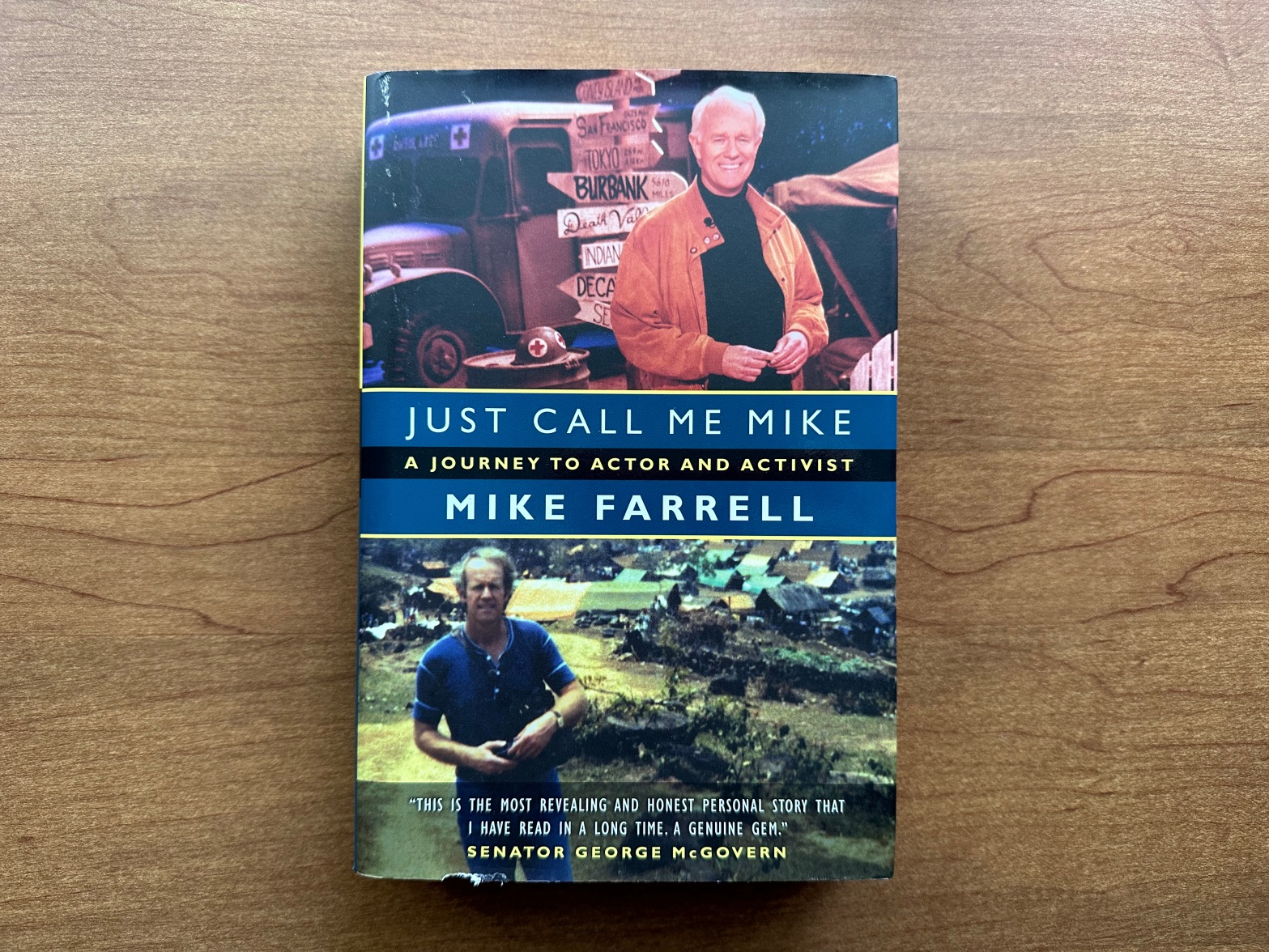What is it?
Farrell, Mike. Just Call Me Mike: A Journey to Actor and Activist. New York: RDV Books, 2007.
Why should M*A*S*H fans care?
Mike Farrell played the role of B.J. Hunnicutt on M*A*S*H for eight seasons, and he is one of only three actors to join the series during its eleven season run. Reading about his experience joining M*A*S*H is interesting, as is learning more about his life outside of the series.
As a M*A*S*H fan, what part(s) should I read?
The chapters primarily focused on M*A*S*H are seven through nine (pages 97 – 129), but, as always, I recommend reading the whole book as M*A*S*H is a common thread that weaves throughout the book.
TL;DR Review
Farrell’s memoir offers a glimpse into his life as an actor and activist, just as the title suggests. He spends a fair amount of time discussing his actor career and his time on popular shows such as M*A*S*H and Providence, but he delves deeper into his personal life, his family, and the causes that he has championed for decades. Just Call Me Mike a must read for M*A*S*H fans and fans of Mike Farrell.
Full Review
When people hear the name Mike Farrell, some think know him from his role as Captain B.J. Hunnicutt on M*A*S*H and others know him as Dr. James Hansen on Providence. There is a third group of people, however, who know Farrell for his activist work on such issues as championing human rights, abolishing the death penalty, ensuring the safe administration of democratic elections around the world, and support of countless political campaigns. Outside of his life as an actor, Farrell became a champion for many causes, and those causes took him to countless states and countries in pursuit of justice and righting the wrongs that he sees across the globe. There are many words that can be used to describe Farrell: actor, writer, producer, activist, husband, father, citizen…and they all explored in this tale of a personal journey and self reflection.

Farrell begins his story with his childhood and early schooling. He grew up in southern California and was interested in service and activism in high school. The death of his father after he graduated from high school affected him and his family, and Farrell joined the United States Marine Corps. He served in Okinawa and Japan before returning to the United States. This makes him one of only two M*A*S*H actors to have served in the military with the other being Jamie Farr. The 1960s, like many in his generation, pushed him to support candidates such as John F. Kennedy and protest things he didn’t agree with, including discrimination and the Vietnam War. By the late 1960s, Farrell also began to act, and he appeared in a number of shows before landing the role that would launch his acting career and allow him to take his activism to the next level.
Farrell admits that he knew of M*A*S*H the series, and he really liked the Robert Altman film. So when his agent asked him if he would be interested in potentially joining the series if Wayne Rogers’ contract negotiations were unsuccessful, he said yes. This was not after season three, however, but after season two. Rogers agreed to continue as Trapper John McIntyre for a third season, but he would ultimately leave the series at the end of that season, leaving an opening in the cast. Farrell was approached, again, about joining M*A*S*H, and he met with Burt Metcalfe, Gene Reynolds, and Larry Gelbart. He was called back to audition with Alan Alda, an audition he admits he was very nervous about. Convinced he had blown his chances of being cast in the series, he was surprised to get the call offering him the role of Captain B.J. Hunnicutt.
B.J. was a very different character from Trapper, and Farrell liked that. He also appreciated that the character was a “family man.” In fact, B.J.’s daughter, Erin, shares a name with Farrell’s daughter. Keeping with the family theme, Farrell’s wife at the time, Judy Farrell, appeared on M*A*S*H a at least eight times. Joining M*A*S*H though was no easy feat. He feared that the series would fail in season four because of him. It would not have been fair to place the blame entirely on Farrell if M*A*S*H had failed in its fourth season, because B.J. wasn’t the only new character that season. Harry Morgan had replaced McLean Stevenson as the 4077th commanding officer, and half-hour shows were not known to change casts and survive. M*A*S*H would go on to thrive for another eight years with B.J. and Morgan’s Col. Potter as central characters.

His increased celebrity had allowed him to champion more and more causes, and this took him away from home when M*A*S*H was not filming for five months of the year. This led to more stress in Farrell’s life at home, and his marriage with Judy ended around the same time M*A*S*H did. After the series ended, Farrell met, and would later marry, actress Shelley Fabares. Their blended families would remain close, and even attend combined family therapy sessions. After the conclusion of M*A*S*H, Farrell took the opportunity to dive deeper into his activism with groups such as Concern America, Cult Awareness Network, Human Rights Watch, Death Penalty Focus, Amnesty International, the Special Olympics, and countless other organizations and political campaigns. Meanwhile, he partnered with Marvin Minoff to create Farrell/Minoff Productions which would produce several television movies and films including Dominick and Eugene and Patch Adams.
Farrell returned to television in 1999 on the series Providence. It would air on NBC until 2002. His activism continued, as did his support of his family as his children graduated high school and began their own lives. He supported his wife’s career, and her health when Fabares became developed an illness during her time on the series Coach. She received a liver transplant in 2000. Over the decades, Farrell has worked for a number of causes that could have easily made him cynical about the state of the world and United States. However, Farrell believes his service and dedication to worthy causes is what every citizen of the United States should strive to do.
Like many memoirs, Farrell’s book is in chronological order, and I appreciate that. I have read autobiographies that are organized by theme or some other literary technique, and they don’t work well for me. It is hard to follow the threads of someone’s life and understand how one event builds on another without a clear chronology of events. Farrell takes the reader along on his journey. Plus, he is a great story teller, and that is evident from page one of the book. As a fan of M*A*S*H and Farrell, I highly recommend his book. Unfortunately it is no longer in print, but used copies can be found online. You can learn more about Farrell’s work and career on his official website.

